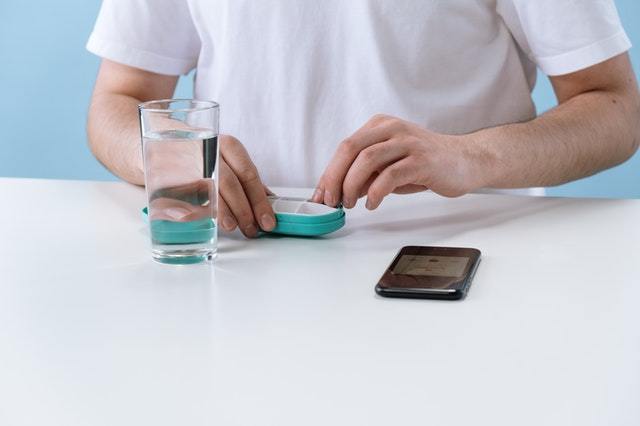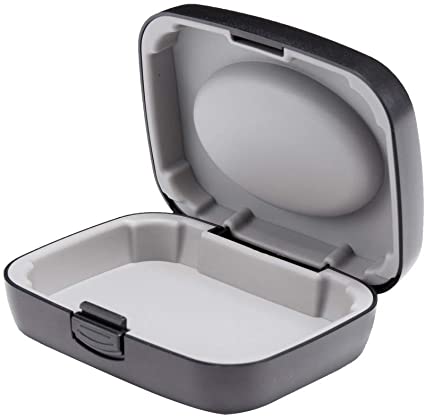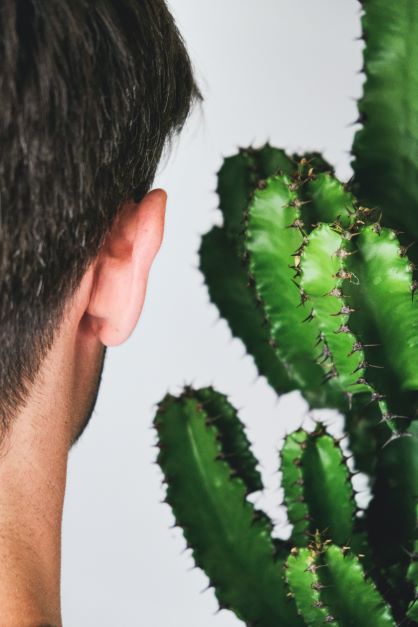Hearing Aid Cases Come in Many Varieties

For many people that suffer from moderate to severe hearing loss, hearing aids are a lifeline. Considering how important and expensive they are, you should definitely protect your hearing aids. Whenever your hearing aids are not in your ears you need to keep them safe. The best way to do that is with a hearing aid case.
Why You Need a Hearing Aid Case
To keep your hearing aids functioning and get the most life out of them, you need to store them properly. Hearing aid cases are instrumental in keeping your hearing aids safe when you’re not using them. There are many factors that can damage your hearing aids, including:
- Dirt and bacteria: Your hearing aids are constantly being exposed to dirt, wax, bacteria, and other germs, especially when they’re in your ears. A good hearing aid case incorporates technology that kills germs.
- Moisture: Hearing aids are constantly being exposed to moisture. A good hearing aid case should also incorporate a dehumidifier.
- Pets and children: Pets and children are notorious for grabbing hearing aids that are left on a table and handling them roughly, often breaking important components.
- Heat and cold: Extreme heat or cold can wreak havoc on your hearing aids by damaging delicate electronics or tubing.
Different Types of Cases
There are many different kinds and styles of hearing aid cases. Most are designed to be compact so that they can fit into your purse, coat pocket, or briefcase. Styles include:
- Value: These types of cases are usually constructed from laminated cardboard or soft vinyl or leather and come in many colors; these cases usually don’t offer much space beyond your hearing aids are primarily designed to keep you from forgetting your hearing aids and keeping dust off of them, and not so much protecting them.
- Basic: Basic hearing aid cases come in different colors and finishes; they usually have a safe grip on the sides, the interior has enough room for one set of hearing aids, and the case easily fits into a pocket.
-
Premium: Premium cases offer the highest quality materials and the most function; they often have spaces not only for your hearing aids, but also for extra batteries and cleaning kits. They are made from strong materials such as hard plastic and usually have a magnetic closure system to lock your hearing aids securely in the case.
As we mentioned earlier, moisture and humidity are two threats to hearing aids that shouldn’t be overlooked. Therefore, it’s recommended you store your hearing aids in a dehumidifier or hearing aid dryer when at home. These types of cases both keep your hearing aids dry or dry them out, but they function slightly differently:
- Dehumidifiers: These types of cases are usually cheaper than hearing aid dryers because they contain no moving parts; they are similar to regular cases, with recesses to place your hearing aids, but they also have a section that contains a desiccant pad or gel. This pad or gel draws moisture out of your hearing aids while you sleep.
- Hearing Aid Dryer: Hearing aid dryers are more expensive options than dehumidifiers because they contain electric fans and heaters that remove moisture and dry your hearing aids. Some dryers also emit ultraviolet wavelengths that kill bacteria and other microorganisms and sanitize your hearing aids. Most models are designed to sit on your bedside table and dry your hearing aids while you sleep, but some travel-sized models are available.
Important Features to Look for in a Hearing Aid Case
There are many hearing aid cases on the market, and some have all of the features that ensure that your hearing aids are clean, safe, and dry. But not all of them do. Some features you should keep in mind when shopping for a hearing aid case include:
Durability
Some hearing aid cases are soft pouches, and while this may keep your hearing aids free of dust, a soft pouch won’t help if you sit or step on the pouch. There are plenty of hearing aid cases that are constructed of heavy duty ABS plastic or even military-grade aluminum; these cases are water resistant, crush resistant, UV resistant, and lightweight.
Anti-germ and Dehumidifying Technology
Your travel case may not be able to have germicidal and dehumidifying properties (although some do), but your home case should absolutely clean and dry your hearing aids while you sleep. This will keep them functioning at their best and make cleaning them much easier.
Hearing Aid Battery Case
Whether your case includes dehumidifying technology or not, when you go to sleep, you should remove your hearing aid batteries; a key convenience is a hearing aid case that includes a compartment to store your main batteries and a backup set. If your current hearing aid does not have this compartment don’t worry! You can purchase separate, tiny individual battery cases that can clip onto your keychain or fit in your purse as well.
Cleaning Kit
Cleaning your hearing aids daily is important for keeping them functioning optimally. Some cases even come with a cleaning kit, but if they don’t an ideal case would ideally have a compartment for storing your cleaning kit.
Waterproof Hearing Aid Case
Although most hearing aids are water-resistant and come with a pre-applied nano-coating to help protect electrical components against water intrusion, it’s still a good idea to keep your hearing aids as dry as possible. Waterproof hearing aid cases do just that, keeping your valuable and expensive hearing aids protected against any accidental liquid splashes or spills.
The information in this guide has been written using the following reliable sources:
https://www.truhearing.com/getstarted, http://valuehearingcare.com, https://gulfgatehearing.com, https://us.hearingdirect.com, https://www.healthyhearing.com
The post Hearing Aid Cases Come in Many Varieties appeared first on Olive Union.






 Everyone has had or dealt with dry skin at some point in their lives. It can be caused by the environment, allergens, lifestyle decisions, and many other varying factors and can be quite a nuisance to deal with, even painful. Similarly, the same can be said for dry ears. Similar to how skin produces oil […]
Everyone has had or dealt with dry skin at some point in their lives. It can be caused by the environment, allergens, lifestyle decisions, and many other varying factors and can be quite a nuisance to deal with, even painful. Similarly, the same can be said for dry ears. Similar to how skin produces oil […] Web designer is a particularly accessible job for the hearing impaired as well, because most of the communication involved tends to be digital. Salary...
Web designer is a particularly accessible job for the hearing impaired as well, because most of the communication involved tends to be digital. Salary...
